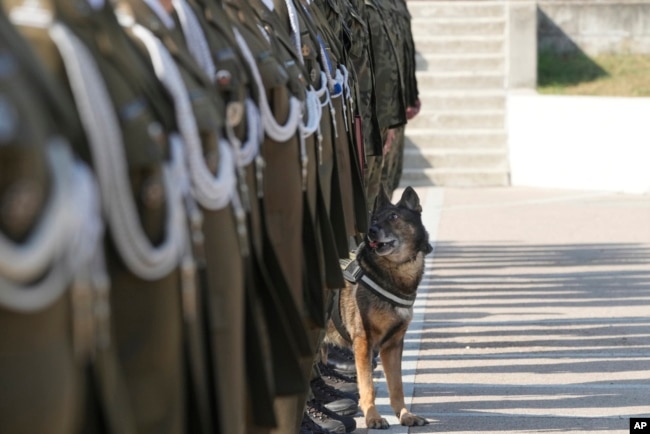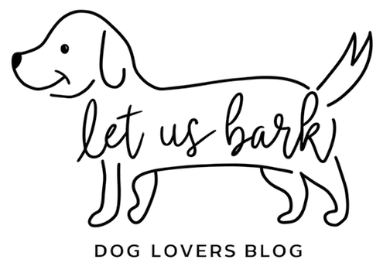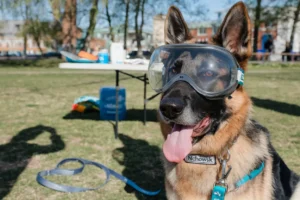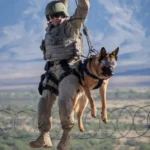In a remarkable display of appreciation, Poland has introduced a new initiative to honor its military dogs by bestowing them with official army ranks.
The recognition, though symbolic, highlights the crucial role these canine heroes play in safeguarding human lives, particularly in explosives detection.

The ceremony, held in a town near Warsaw rich in military history, saw four dogs—Einar, Eliot, Enzo, and Emi—receive their ranks amid full military pomp.
These dogs, including German and Dutch shepherds and Belgian Malinois, are part of the 2nd Mazovian Engineer Regiment, the first unit in Poland’s armed forces to integrate dogs into service back in 2007.
The regiment’s dogs have served on numerous international missions, from Iraq and Afghanistan to the recent Summer Olympics and Paralympics in Paris, where they played a vital role in reinforcing security measures.
Each dog’s handler was presented with a badge of rank, which was attached to the dog’s harness, during a special ceremony marking the regiment’s 80th anniversary.
Captain Dominik Płaza, a spokesperson for the unit, emphasized that the ranks are meant to acknowledge the dogs as members of the armed forces, not merely tools.
“It is not just a tool for detecting explosives, but a living being,” Płaza said, stressing the significance of recognizing the dogs’ service.
The decision to award dogs military ranks, ranging from private to sergeant, was introduced last year by General Wiesław Kukuła, chief of the Polish army’s general staff. The move has been widely welcomed by the handlers, who view it as a meaningful way to honor the dedication and hard work of their four-legged partners.
Lance Corporal Daniel Kęsicki, handler to 2-year-old Belgian Malinois Eliot, spoke of the deep bond between handler and dog, calling the rank a “symbolic recognition that the dog”.
Contents
Conclusion
The recognition of military dogs with official ranks in Poland reflects the nation’s deep appreciation for their invaluable service in protecting lives. These loyal and hardworking animals are not only vital assets in detecting explosives but also cherished companions to their handlers, with whom they form lifelong bonds.
The decision to honor them with ranks symbolizes their status as true members of the armed forces, reinforcing the importance of their contributions on both national and international missions.
As Poland continues to honor and care for its service animals, this program highlights the enduring bond between humans and their loyal canine partners, ensuring that their dedication does not go unnoticed.
FAQ’s
1. What is the purpose of giving military dogs ranks in Poland?
The ranks are a symbolic way to honor the hard work and dedication of military dogs, recognizing them as important members of the armed forces, especially for their role in explosives detection and security.
2. Which dogs were honored with ranks in the recent Polish ceremony?
Four dogs—Einar, Eliot, Enzo, and Emi, including German and Dutch shepherds and Belgian Malinois—were awarded ranks in a special ceremony near Warsaw.
3. What kind of missions have Polish military dogs participated in?
Polish military dogs have been deployed on international missions in places like Iraq, Afghanistan, and more recently in Paris for the Summer Olympics and Paralympics, where they helped ensure safety by detecting explosives.
4. How are military dogs integrated into the lives of their handlers?
Handlers select, train, and live with their dogs, developing a strong bond that lasts even after the dogs retire. Many handlers continue to care for their dogs as part of their family after service.
5. Who introduced the system of military ranks for dogs in Poland?
General Wiesław Kukuła, chief of the general staff of the Polish army, introduced the system last year, which includes six military ranks for dogs ranging from private to sergeant.
6. Are military dogs in Poland given retirement benefits?
Yes, Poland has extended retirement benefits to dogs and horses working in the military, police, border guard, and fire departments, ensuring their well-being after they complete their service.







